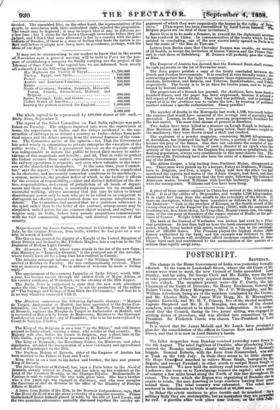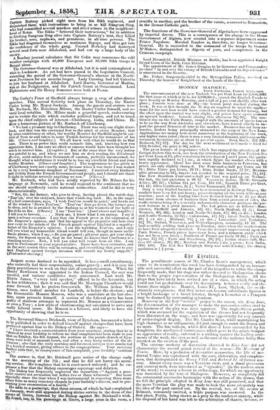POSTSCRIPT.
SATURDAY.
The change in the Home Government of India was yesterday formally effected. In the room in Leadenhall Street, where the old Court of Di- rectors were wont to meet, the new Council of India assembled. Lord Stanley, and his aides, Sir George Clerk and Mr. Baillie, were the first to take possession of their newly acquired dominion. The Council met at two o'clock. The members present were—Sir F, Currie, the late Chairman of the Court of Directors ; Sir Henry Rawlinson, General Sir Robert Vivian, Sir Henry Montgomery, Mr. I. P. Willoughby, and Mr. William Arbuthnot, being six of the members nominated by the Crown; and Mr. Charles Mills, Sir James Weir Hogg, Mr. E. lifacnaghten, Captain Eastwick, and Mr. H. T. Prinsep, five of the elected membere. Captain Shepherd and Mr. R. D. Mangles, two other of the elected members, were understood to be absent from indisposition. It is under- stood that the Council, during its two hours' sitting, was engaged in settling forms of procedure, and was divided into committees by the President. Sir Frederick Currie was chosen Vice-President by Lord Stanley. It is stated that Sir James Melvin and Mr. Leach have arranged a plan for the consolidation of the offices in Cannon Row and Leade.uhall Street, and that it is now in Lord Stanley's bands.
Thefuller despatches from Bombay received yesterday come down to the 4th August. The rebel fugitives of Gwalior, after plundering TSbukr entered the Boondee territory, closely followed by Colonel Holtnes'e brigade. General Roberts, with the force from Nusseerabad, Walistill at Tonk on the 19th July. In Oude there seems to be little change. Sir Hope Grantihad marched to relieve Marin Singh, besieged by the Begun; and occupy Fyzabad ; in other words to compel Mann Singh to declare himself. We now hold the military road between Cawnpore and Lucknow ; the route on to Nawabgunge beyond the capitol; and a strip of country_ a few miles broad along the North of this line throughout its extent. The force which the Begum was organizing at Boondee she is unable to retain, the men deserting in large numbers leaving their arms behind them. The rebel treasury was exhausted. The rebel force scattered in detachments in Oude is estimated at 60,000 men.
In Behar the rebels continue to give trouble and do mischief. As a military body they are contemptible, but as marauders they are powerful for evil. A guerilla affair took place near Debree, on the 18th July.
captain Rattray picked eight men from his Sikh regiment, and despatched them with instructions to bring in or kill Sungram Sing, who had committed several murders and other crimes in the neighbour- hood of Rotas. The Sikhs "bettered their instructions," for in addition .0) fetching Sungram Sing alive into Captain Rattray's tent, they killed his brother, sons, nephews, and grandsons, in all nine persons. The Orbs had disguised themselves as mutinous Sepoys and thus got into the confidence of the whole gang. Colonel Berkeley had destroyed several mud forts near Allahablid, and had cut up a large body of the
enemy. A Bombay journal calculates that Sir Colin may commence the cold weather campaign with 46,000 European and 30,000 Sikh troops in Bengal alone.
The Governor-General was at Allahabad, but it is said contemplated a visit to Lucknow. An act had been passed in the Legislative Council, extending the period of the Governor-General's absence in the North- west Provinces for six menthe longer. Lady Canning had left Calcutta to join her husband at Allahabad. Lord Harris, Governor of Madras, was at the Neilgherries, and Sir Patrick Grant at Ootacamund. Lord Elphinstone and Sir Henry Somerset were both at Poona.
The Cutler's Feast at Sheffield always brings a crop of after-dinner speeches. This annual festivity took place on Thursday, the Master Cutler being Mr. Mayor Jackson. Among the guests and orators were Ter. Roebuck, Mr. Monekton Milnes, the Master Cutler himself, and se- veral local notables. Mr. Milnes made a graceful speech, endeavouring not to violate the rule which excludes political topics and yet to touch upon the chief subjects of interest—Cherbourg, India, and China. He drew a humorous picture of Mr. Roebuck off Cherbourg. "We had a pleasant trip to Cherbourg. There HMG only one slight draw- back, and that was the continual fear in the mind of every Member, that by some contrivance or other, the worthy Member for Sheffield might be ear- ned of from us and taken to some French fortress for the remainder of his life. (Cheers and laughter.) We all knew well what he would do in that case. There is no power that could manacle him, and, knowing how you appreciate him, I am sure no effort or ransom would have been thought too much to recover him. (Laughter.) But at the same time the very notion waspainful to us, and when we saw him on deck reading. the Edinburgh Renew, amid salutes from thousands of cannon, perfectly unconcerned, we thought what a misfortune it would be to lose my excellent friend and your worthy Member. (Cheers and laughter.) Thu impressions he has given us of Cherbourg were not exactly mine, because when I was there I was waited
e n by a very handsome daughter of Normandy. I received every kindness 'and civility from the French Government and people, and I should not think it night to criticize Severely anything we saw." (Cheers.) Mr. Roebuck, who had been mildly reproved by Mr. Milnes for his language at Newcastle, said he would respond to the sentiment that no one should needlessly excite national animosities. And he did so very characteristically. "But, Sir, the farmer, who goes to sleep, having placed the watch-dog,
• Tear'em,' over his rickyard, hears that watch-dog bark. He, in the auger of a half somnolence, says, I wish Tear'em would be quiet,' and bawls out of the window Down Tear'em." Tear'em ' does go down, the farmer goes to sleep, and he is awaked by the flashing in at his windows of the light of his ricks on fire. (Cheers.) I am • Tear'em.' (Loud cheers and laughter.) I tell you to beware Mark Inc. I know what I am saying. 1 say it upon a solemn occasion. I say that the French press is the expression of the Emperor's opinion, and that his appeal to the prejudice and hate that now exist in the minds of the French people against England is a manifes- tation of the Emperor's opinion. I am the watchdog Tear'em, and I only tell you what may honourable friend would tell you, though in more melli- fluous phrase, when I say,.—Be you prepared; get your guns, get your ships ready, for depend upon it, that in his heart he knows that Clierbourn. is a standing menace. Now, I tell you what will result from all this. 1 am sent to Parliament as your representative. There have been estimates, and in the next session there will be estimate, and everything that goes to pro- tect England against foreign invasion will receive my hearty support." (Protracted cheering.) .
Reigate seems destined to be mystified. It has a small constituency, who naturally feel their responsibility, rather gravely ; and it is easy for sharp practitioners to work on that sort of conscientiousness. When Sir Henry Rawlinson was appointed to the Indian Council, the scat was Vacated, and various candidates were announced. Last week Mr. Edwin James, "every bold speaker," offered to be the favourite, but he has withdrawn; then it was said that Mr. Montague Chambers would come forward, but he prefers Greenwich. Mr. William Arthur Wil- kinson, once radical member for Lambeth, is before the electors ; and the Honourable Monson Monson, who was a candidate at the last elec- tion, again presents himself. A section of the Liberal party has been guilty of studious attempts to represent Mr. Monson as a Conservative or even a Tory ; a low style of electioneering not calculated to serve any really Liberal cause. Mr. Monson is a Liberal, and likely to have the opportunity of showing that he is so.
The Reverend Simeox Bricknell, vicar of Eynsham, has caused a letter to be published in order to defend himself against charges that have been preferred against him to the Bishop of Oxford. He says-
- " I have received a communication from your secretary, stating that be is `desired byyour lordship to inform me that complaint has been made to you Unit on Sunday, the 8th August, the services in the parish church of Eyn- sham were held at unusual hours, and after a very hasty notice of the al- teration ; also that the early morning and forenoon services were conducted In a hurried manner, giving offence to the congregations.' Your secretary further adds that, in consequence of this complaint, your lordship cautions The answer is, that Mr. Bricknell gave notice, of the change early on the morning of the 7th ; and that he did not hurry the morn- ing service. He complains that he is condemned unheard ; and he ex- Presses a fear that the Bishop encourages espionage and deletion. The Bishop has frequently neglected the injunction—" Against a pres- byter receive not accusation but before two or three witnesses." But more especially since the time when I was instrumental in removing three stone altars from as many cemetery chapels in your lordship's diocese, and in pre- venting your consecration of a fourth."
He adds in a postscript, that three creases, of which he had complained in January, were still appended during divine service to the dress of the curate of Grove, licensed by the Bishop against Mr. Bricknell's wish. He found, too, in his parsonage at Grove, a large cross in the remit a crucifix in another, and the brother of the curate, a convert to Romania*, in the Roman Catholic garb.
The functions of the Governor-General of Algeria have been suppremed by imperial decree. This is a consequence of the change in the Home Government of Algiers, now erected into a separate department under Prince Napoleon. Marshal Minden is, therefore, no longer Governer- General. He is succeeded in the command of the troops by General M‘Mahon, distinguished in Algeria of yore, and conspicuous in the Crimean campaign.
Lord Bloomfield, British Minister at Berlin, has been appointed Kuight Grand Cross of the Bath, Civil Division.
The appointment of Mr. Jame Douglas to be Governor and Commander- in-chief " in and over the colony of British Columbia and its dependencies" is announced in the Gazette.
Mr. Fisher' Surgeon-in-chief to the Metropolitan Police, received on Thursday the honour of Knighthood at the hands of the Queen.



































 Previous page
Previous page